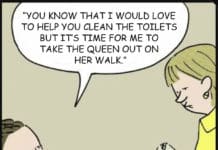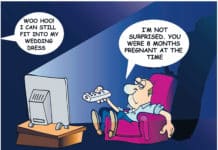By the time the future arrives, it is disguised as the present, and almost immediately slips away into the past. The past is lost forever, and the future never arrives, what sort of bizarre arrangement is that? The tenses we were taught about in school — Past, Present, Future — have somehow segued into Pre-pandemic, Post-pandemic and Let’s Hope for the Best.
When Californians talk about “The Big One” they mean the long-awaited earthquake somewhere on the San Andreas Faultline which will spell disaster for their cities and cause tidal waves to wipe out even the most sure-footed surfers. I believe some plates will also be broken.
For the world at large, Covid-19 proved to be our ‘big one’, a pandemic capable of bringing societies and economies to their knees. But fear not, help was at hand to get us back on our feet, instead of being down on our uppers, however illogical that sounds. I never did finish that night school writing course after my pencil broke.
Apparently ‘post-pandemic transformation’ means we must embrace uncertainty — done that — and accept ‘unruly alternatives’ to our present way of thinking, if it isn’t already unruly. It seems that clear messaging is the key to any campaign, especially if you want people to behave in a certain way. Is that the opposite of embracing uncertainty, the message isn’t quite clear.
If we are seeking answers, we could do worse than listen to The Seekers, whose lyrics assure us that “though the carnival is over, there’s a new world somewhere, they call the promised land.” (‘They’, presumably, being the politicians, pledging jam tomorrow, as usual.)
Every plague does have some strange side effects. There are advances in musical appreciation and greater awareness of public health — “Sing as you wash those hands!” By eliminating the daily commute for large numbers of people, the planet’s collective carbon footprint has been reduced.
There are fewer cars on the road nowadays and fewer planes in the air. More chickens can cross the road safely, fewer birds are in danger from aircraft engines. Less time spent in traffic has meant more time to bond with the immediate family at home, either that or strangle them. The new normal.
Was Covid a dress rehearsal for the larger — yes, larger — problem of climate change? Has it improved our critical thinking regarding humanity’s future? Has it made us reconsider our habits when it comes to social inequality? — “Our vax programme is better than yours!”
Imagining the future can be a powerful coping mechanism to gain some sense of control during an unpredictable time. For too many of us, the future has changed from being a promise to being a threat. Einstein said he didn’t know how World War III would end, but he suspected World War IV would be fought with sticks and stones. Which doesn’t sound nearly as bad as an earthquake in California.






